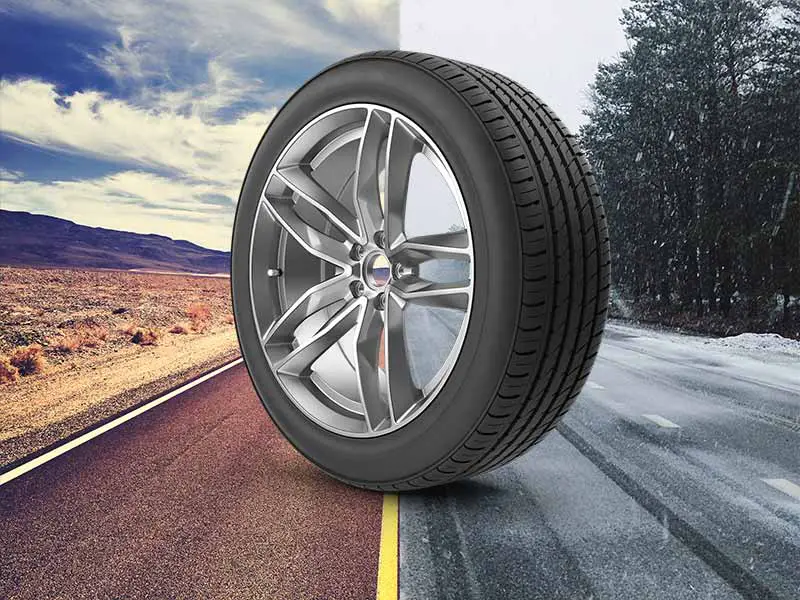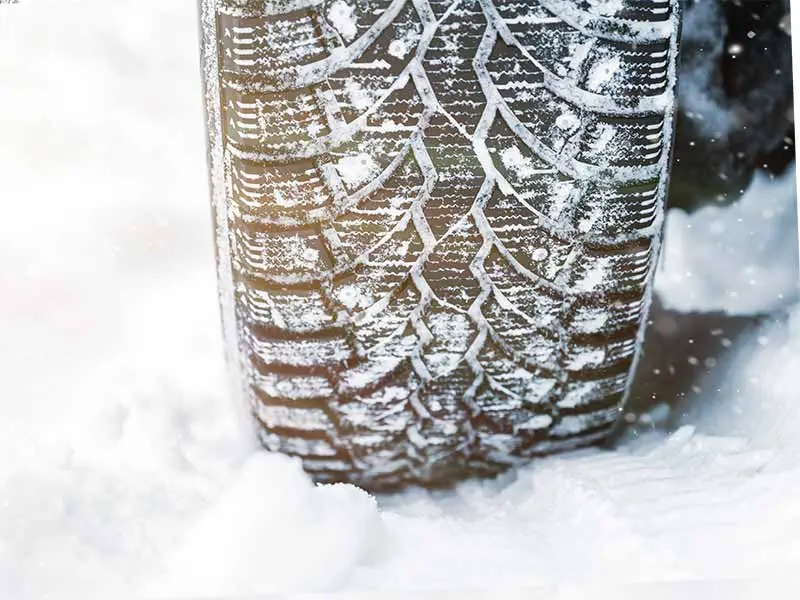Ever wondered if your car’s summer tires are like ice cubes in the winter, losing their grip and skidding around? It might seem like a strange question, but understanding how your car’s shoes (tires, that is) behave in different temperatures can be a real game-changer for your safety on the road.
Summer Tires In Winter
Summer tires in winter, especially in cold temperatures, can become hard and lose traction, making driving risky. While they won’t necessarily crack, their performance will significantly decrease compared to winter or all-season tires.
In this article, we’ll delve into the fascinating world of tires, exploring the differences between summer, winter, and all-season tires. We’ll address key concerns about using a summer tire in winter, such as the potential for cracking, their safety in cold weather, and how they perform at different temperatures. We’ll also tackle the question of whether you can use a summer tire year-round, and finally, provide guidance on choosing the right tires for the right season.
Let’s take a closer look.

Understanding Tire Types: Summer, Winter, and All-Season Tires
When we talk about tires, it’s like talking about shoes. You wouldn’t want to wear flip-flops in the snow, right? Or heavy boots on the beach? Well, tires are a lot like that. They’re designed to work best under specific conditions. Let’s break down the three main types: summer, winter, and all-season tires.
Summer Tires
Summer tires are like your favorite pair of sandals. They’re fantastic when it’s warm out! These tires are made for speed and agility, offering a top-notch grip on both dry and wet surfaces. Because of a special type of rubber that gets harder in cold temperatures, a summer tire provides excellent traction in hot weather. However, as the temperatures drop, that same rubber can become less flexible, which leads to a decrease in performance.
Winter Tires
On the other side of the tire spectrum, we have winter tires. Think of these as your trusty snow boots. They’re designed specifically to deal with the harsh conditions of winter. Dedicated winter tires, sometimes called snow tires, have a unique tread design with deeper grooves and sharp, jagged edges. This deep tread helps to grip snowy and icy roads better. The rubber used in winter tires stays flexible even in extremely cold temperatures, which aids in better traction and control.
All-Season Tires
Lastly, there are all-season tires. These are the sneakers of the tire world. Not as casual as sandals, not as robust as boots, but a good middle ground. They’re designed to be a mix of both summer and winter tires. They provide balanced dry and wet performance and offer a comfortable ride in warmer temperatures. They can handle mild winter conditions too, but they might not be the best choice in severe winter weather.

What Happens to Summer Tires in Winter?
Think about what happens when you put a rubber band in the freezer. It becomes stiff, right? And if you try to stretch it, it’s likely to snap. Well, summer tires can react in a similar way to cold temperatures. Let’s dive deeper into what happens to summer tires in winter.
Effects of Colder Temperatures on Summer Tires
When the temperatures drop, summer tires can face some serious problems. The rubber compound used in summer tires, which is perfect for gripping dry and wet surfaces in warm weather, doesn’t do so well in the cold. This rubber gets hard and loses flexibility, reducing the tire’s ability to grip the road effectively.
Summer Tires Cracking in Winter
One big concern is whether summer tires can crack in winter. The answer is, unfortunately, yes. As the rubber gets harder and loses its flexibility, it becomes more prone to cracking under pressure or when it hits a bump or pothole. It’s like that rubber band we talked about earlier.
Temperature Range of Summer Tires
Summer tires are designed to perform optimally in temperatures above 45 degrees Fahrenheit. When the thermometer dips below this, your summer tires may not provide the best traction or handling.
Summer Tires in Cold Weather
It’s also important to note that using summer tires in 40-degree or 30-degree weather can lead to reduced performance.
Summer Tires in 40-Degree Weather
In 40-degree weather, you might begin to notice that your summer tires aren’t gripping the road as effectively as they should. This can lead to longer stopping distances and reduced handling abilities, especially on wet surfaces.
Summer Tires in 30-Degree Weather
As the temperature dips to 30 degrees, these issues will become more pronounced. The tire’s tread won’t be able to flex and grip the road as effectively, leading to a lack of control and longer braking distances.

Can You Use Summer Tires Year-Round?
Now, you might be thinking, “What if I just use my summer tires all year? I don’t see much snow anyway.” Well, let’s dig into this topic a bit to understand why it’s not the best idea.
Risks of Using Summer Tires in Winter
Even if you live in an area where snow is as rare as a unicorn, using summer tires in winter can still be risky. Remember, it’s not just about the snow. It’s also about the cold. Summer tires are made of a rubber compound that doesn’t perform as well in colder temperatures. It gets hard, which can lead to less traction and more sliding on the road. Think of it like trying to run on ice with sneakers – you’re not going to get very far before slipping!
Wearing Out Faster in the Cold
Another aspect to consider is the wear and tear on your tires. The hardness of the rubber in cold weather can lead to faster tire wear. This is because the rubber isn’t able to flex and grip the road as effectively, leading to uneven wear patterns. So not only could using summer tires in winter be a safety risk, but it could also hit your wallet when you need to replace your tires sooner than expected.
Losing Air in Winter
You might have also heard that tires can lose air in the winter. This is true. As the temperature drops, the air inside your tires can contract, leading to lower tire pressure. While this isn’t specific to summer tires, it’s still a crucial factor to consider. Low tire pressure can lead to increased tire wear and tear, as well as reduced fuel efficiency.

Choosing the Right Tires for the Right Season
So, we’ve talked about the differences between summer and winter tires, and the risks of using summer tires in winter. But what’s the best tire for each season? And how do all-season tires fit into this? Let’s find out!
The Potential of All-Season Tires
All-season tires are like a good pair of sneakers. They’re not perfect for every situation, but they can handle most things reasonably well. These tires are designed to be a compromise between summer and winter tires. They offer a good balance of performance for dry and wet conditions in warmer temperatures, and they can handle mild winter conditions too.
However, remember that all-season tires are a compromise. They might not perform as well as summer tires in hot weather or as winter tires in cold, snowy conditions. But if you live in an area with mild winters and you prefer not to switch tires with the seasons, all-season tires could be a good option for you.
Changing Tires With the Season
If you’re up for it, changing your tires with the seasons is generally the best way to get optimal performance and safety from your tires.
Use summer tires in the warm months when temperatures are regularly above 45 degrees Fahrenheit. They’ll give you great grip and handling on both dry and wet roads.
When temperatures start to consistently drop below 45 degrees, it’s time to switch to winter tires. They’ll provide the grip and control you need on cold, wet, snowy, or icy roads.
The Importance of Winter Tires
Winter tires are crucial for safe driving in cold weather, especially if you live in an area with severe winters. Even if you don’t see much snow, the colder temperatures can harden the rubber in summer and even all-season tires, leading to less traction. Winter tires use a special rubber compound that stays flexible in the cold, allowing for better grip and control.
Resources
Below are some links you may find helpful when learning about tires
- Summer tires in winter – Continental Tires
- Can I drive summer performance tires in cold temperatures? – Tire Rack
Final Thoughts
It turns out that using summer tires in winter is a lot like wearing flip-flops in the snow. While you can technically do it, it’s not the safest or most comfortable choice. The cold temperatures can make summer tires hard, leading to less grip and control on the road. Even without snow, using summer tires in winter can lead to reduced performance, faster wear and tear, and even potential safety risks.
Switching your tires with the changing seasons is the best way to ensure optimal performance and safety. Summer tires are great for warm weather, winter tires excel in the cold, and all-season tires can be a good compromise if you live in an area with mild winters. Remember, choosing the right tires for your vehicle isn’t just about performance; it’s about safety.
Good luck and happy motoring.





